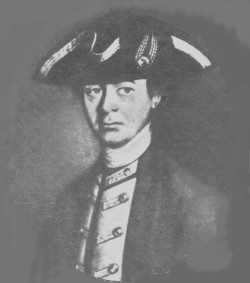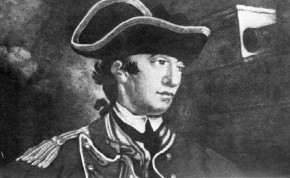|
British General Sir William Howe, British Admiral Richard Howe Howe and Howe fight the "rebels" When Vice Admiral Richard Howe arrived in New York to reinforce Major General Sir William Howe in July 1776 all British military in America was commanded by two men who not only were brothers but are believed to have been cousins of King George III. Their grandmother, the Baroness Kielmansegge, was once a favorite mistress of George I. Despite the royal connection, the brothers, whom the British charged with suppressing all rebellion in the Colonies, were previously staunch advocates of a reconcilliation between Britain and the Colonies.
For nearly a decade, Admiral Howe, born in 1726 and three years older than William, had voted in Parliament against coercive measures toward the Colonies. In early 1775 he had met Benjamin Franklin, who, while serving in Britian, had begun playing chess with Howe's widowed sister Caroline, then 54. Admiral Howe soon started consulting Franklin in an attempt to work out compromise peace proposals. He also unsuccessfully sought permission from Lord North's ministry to lead a peace delegation to the Colonies himself. Both Howes, moreover, had had attachments for many years with the Colonies. Their elder brother, George, one of the few British generals who was popular in the Colonies, was killed fighting near Ticonderoga in 1758 during the French and Indian War. (The colony of Massachusetts even raised £250 to erect a monument in Westminster Abbey in London.)
General Sir William Howe
William Howe served in North America from 1758 to 1761 as a young officer, eventually leading his brigade up the cliffs at Quebec to help Wolf defeat Montcalm on the Plains of Abraham. As a Member of Parliament from Nottingham, he told his constituents that if offered a command in any war against the Colonies, he would refuse to serve. However peaceable their politics had been, both Howes had reputations as aggressive tactical officers, and each reached the top of his profession not only through high connections but through high competence. The Howes were born into a rich, powerful, aristocratic Hertfordshire family. Both went to Eton. As a 16-year-old midshipman, Richard sailed with Admiral George Anson on his arduous, aborted voyage around the world. Thereafter he rose rapidly from command to command, becoming treasurer of the Navy in 1765 and a rear admiral five years later. Responsible, serious to the point of tediousness, heavy-browed and large-nosed, he was known in the Navy as "Black Dick" Howe, partly because his face had darkened from 30 years of quarter-deck weather, partly because an air of somber resolution had surrounded him ever since he boldly pursued the French fleet among the rocks of Quiberon Bay in 1759. In profligate London, Admiral Howe was reknowned as a faithful husband. Not so Brother William, a shallower, more convivial personality who, though married, liked his lass and his glass. General Howe's goings on with pretty blonde Betsey Loring, 25, whom he met in Boston in 1775 and was thought to have brought with him to New York (along with her complaisant husband), had already given rise to a number of salacious ditties. Because of her unofficial power, she was kown among British officers as "The Sultana." Despite Sir William's frivolities, he had served with great bravary, earning a reputation for combat discipline, skill in training men and planning tactical military operations. In 1774 he created a new drill for light-infantry companies and pioneered a new system whereby flexible, fast-paced companies were attached to every regiment of the line. Lord George Germain, Britian's Secretary of State for the American Colonies and a leading advocate of an aggresive policy, remarked when Howe was appointed that no other officer was so well qualified to teach European soldiers how to fight from "behind trees, walls or hedges." Together the Howe brothers commanded one of the largest military and naval forces assembled in the century. They had many choices -- and almost complete discretion -- about how to employ it. Both Howes were justly famous for being concerned about the welfare of their men. [In fact, William was called "Gentleman Johnny" by his soldiers.] Sir William, for instance, was reportedly shocked by the high number of British casualties during the frontal assault on Bunker Hill, which he led in June 1775. He was known to subscribe to a new European doctrine that pitched battles were less important than tactical maneuvering in winning wars. Continental officers were nevertheless astonished when Howe did not follow up the hard-won victory at Bunker Hill by an immediate advance on the American camp at Cambridge, which would surely have fallen. Another clue to the Howe brothers' intentions may have been shown in reports from London that Admiral Howe agreed to accept his command only with the understanding that he would have the right to act as Royal Commissioner in attempting to work out a reconciliation with the colonies. Although no details were known, military sources in London believed that Howe hoped to persuade the Continental Army to lay down its arms in exchange for new negotiations. He had very little chance for success. |
All rights reserved. For details and contact information: See License Agreement, Copyright Notice. |

